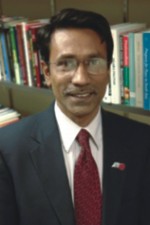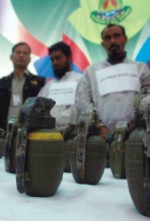|
Interview
Emergence of Islam in South Asian Politics
Extremist interpretations of Islam contradict the way Islam was introduced in Bangladesh and in the subcontinent. During the 1200s mystic Islamic evangelists brought Islam in the subcontinent, long before the Mughals had conquered this land, at the end of the Sena dynasty. The mystique religious practices of these people, known as the Sufis, found a fan following among the lower cast Hindus, who were tortured and harassed by the upper caste Brahmins, the Sena royals. Love, care and sanctuary given by the Sufis and the equality and peace preached in Islam made many Hindus turn to Islam. Local Rajas being impressed with their altruism rewarded them with lands and villages, which the Sufis used to build Khankahs for the poor and deprived. This is quite opposite to the trend of the false Faqirs and Babas we have today in the subcontinent who try to fool and rob the innocent. Sufism was not just about religion; it was about culture, love and humanity. Sufism inspired Vaishnavism in the subcontinent, which introduced the cast-free, Hindu mystique religious practice. Dr Ali Riaz, Professor and Chair of the Department of Politics and Government, Illinois State University provides his view, supported by historic evidence, on the emergence of Islam in South Asian politics with The Star.
Is the British Raj the originator of bringing in religion in South Asian politics, because no annals suggest the emergence of it before the colonial period?
 |
Dr Ali Riaz |
Religion has always been a part of social life in South Asia. But it was not the principal marker of social identity or an issue of politics until the British colonial administrators decided in 1772 to apply “the laws of Koran with respect to Mohammedans and that of the Shaster with respect to Hindus.” The decision by Warren Hastings and William Jones paved the way for a division between Muslims and Hindus and brought religious identity to the fore. This differentiation was further accentuated by the first census that was conducted in 1872. In the census, respondents were categorised by their religions. These steps were matched with other social developments. For example, at the cusp of the nineteenth century a sector of the Muslim community began to lament the disintegration of the Mughal Empire and to endeavour to locate their position within the changing political structure. For them, this was a question of identity rather than a political mobilisation effort. Both Shah Waliullah (1703- 1762) and Syed Ahmed Barelvi (1786-1831) can be seen as representatives of that endeavour, though they approached the issue from diametrically opposite directions. In a similar vein madrassah such as Deoband Darul Ulum and social organisations were founded in mid-19th century. In the North West Frontier region, between 1826 and 1831, religious war was waged against the Sikh and British colonial power by Syed Ahmed Barelvi. Within the Hindu community, this can be traced back to the founding of Vedic Schools in 1869 which led to the founding of Arya Samaj in 1875. By early 20th century we also witnessed the establishment of the Hindu Mahasbaha. By the mid 19th century political discourse in India was full of religious imagery. My point is that the relationship between religion and politics is long and very complex. Although the British colonial power is to blame for utilising the religious divide, they are not the only one who made use of it.
This region has been known for being secular even during the colonial period. After the birth of Pakistan, our secular culture faced many challenges from orthodox quarters in West Pakistan. When did these communal fanatical ideologies enter into Bangladeshi politics?
Secularism is a contested and multi-dimensional concept. I am not sure whether we can say people in Bangladesh have always been “secular”. It depends on what you mean by being secular. Instead I would say, Bengalis are generally averse to the idea of mixing religion and politics. However, there are instances of using religion as a political mobilisation tool. Take for example, the Faraizi movement in the 19th century, or the immense popularity of Titumir. In the mainstream politics, after 1947, populist leaders have used religious idioms and imagery Maulana Bhasani is a case in point. In all these cases, I think, religious objectives were not the reason for the mobilisation. After the independence of Bangladesh, secularism was inserted into the constitution as one of the state principles; but there was very little discussion on what it really meant. If the framers of the constitution meant separation between the state and the religious institutions it should have been discussed and debated more robustly. The experience of Pakistan, particularly the abuse of Islam as a political ideology by the ruling class, was the principal impetus. The concern was quite legitimate, and the aspiration to keep religion and state separate was widespread. But there isn't a single model of the separation between state and religion. Unfortunately, before the nation could have explored the issue further, secularism was removed from the constitution by force. Again, there was no discussion, no debate. At that point the military rulers wanted an ideology to legitimise their actions and they used religion to that end. As I said, religion, particularly Islam has always been part of the social life this was used for political gains. This is what opened the door for the Islamisation of the society and allowed the religio-political forces to flourish. These are post-1975 developments.
What makes 'Islamic fundamentalist' politics so prominent and talked about, as there are other kinds of religious militancy active all over the world?
 |
A religion of peace, at times is used to justify the violence caused by Machiavellian militants. Photo: Star File |
Globally speaking, Islamic extremists are not the only violent force. I would like to make three points here. First, not all violence is inspired by religions. Second, you're absolutely correct that there are extremists within almost all religions and that religion is used by these groups to justify their violent acts. The BJP and its ilk in India is perhaps the most pertinent example in this regard. We have witnessed rise of extremist religio-political force within Judaism and Christianity as well. My third and final point, not all Islamic fundamentalists are violent. Now, the question is – why does Islamic extremism receive more attention? There are several reasons; time will not permit me to explore all. In brief, it is deeply tied to the foreign policy of the Western nations, particularly the United States. After the demise of the Soviet Union the policy-makers of the Western powerful nations portrayed Islam as an enemy and shaped the discourse. This short-sighted and egregious policy has created an environment within which Islamic extremists have gathered strength and is now able to pose challenge to the peace and stability both locally and globally, and cause havoc. This being said, there are also particular local factors which engendered Islamic militancy; for example the emergence of Laskar-e-Jihad in Indonesia, Abu Sayyef in the Philippines, Harkat-ul Jihad al Islami and Laskar-e-Tayeba in Pakistan can be traced back to different reasons. The concern is whether these local, national, militant groups are being linked up with the transnational terror group called Al Qaeda. Also of concern is whether individuals, irrespective of their locations, are being radicalised. Radicalised individuals and small groups without any links to transnational terrorist organisation can be serious threats to national and international security.
What role does democracy play?
If we are talking about blending religion and politics, democracy is not an antidote. Take India for example. The largest democracy of the world has allowed a religio-political party to be in power. Many political scientists argue that democracy should not be used to silence those who support religion to be a part of politics. Democracy, by definition, should be inclusive. But it is also important to note that state should distance itself from religion of all kinds. The modalities of this separation vary we have already seen various models the French model, the US model and the British model. They are different from each other. All have their upsides and downsides. It is necessary to explore options, discuss and debate. Democracy allows us to have that debate.
Do you think the present practice and interpretation of Islam in many cases, come into conflict with secular values?
I don't think that secularism and Islam have contending positions. The separation between temporal and spiritual power is not new to Islam. Prominent scholars of history and political thoughts have already demonstrated that the separation began as early as the end of the first century of the hijri. Throughout the history of Islamic empires and states, the separation between spiritual and temporal powers has been the defining feature. Merger of these two domains is an idea promoted by the Islamist ideologues such as Syed Qutb, Abu al Maududi and Ayatollah Khomeni. These interpretations of religious texts are politically motivated rather than religion-inspired. Khomeni's notion of Velayat-E Faqih is a departure from Shia theological doctrines.
Interviewed by: AANTAKI RAISA
Copyright
(R) thedailystar.net 2010 |
| |
